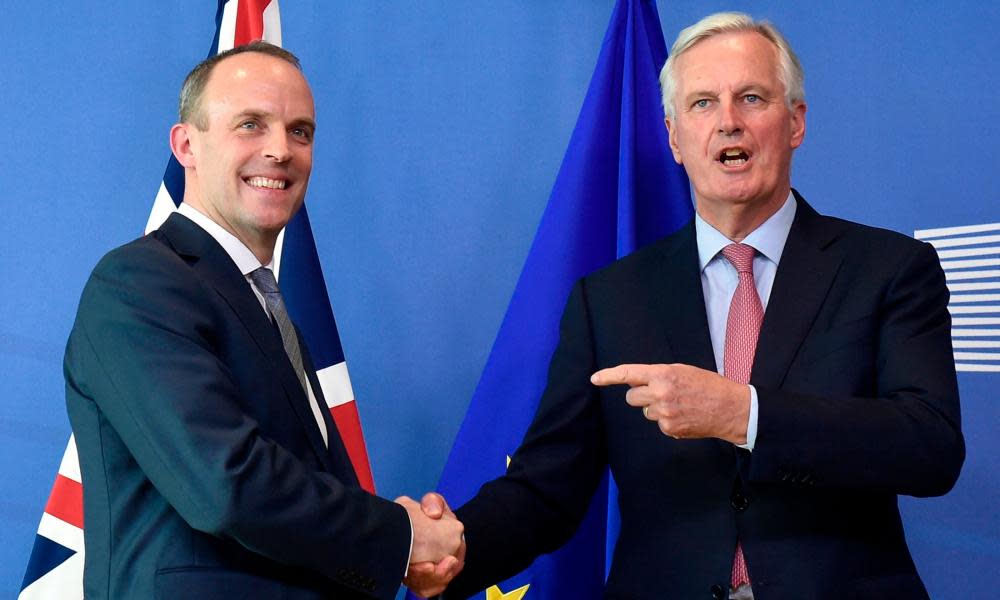Brexit: Raab and Barnier meet as EU steps up no-deal warnings

The new Brexit secretary, Dominic Raab, has held his first meeting with the EU’s chief negotiator, Michel Barnier, as the EU sent out its strongest warning yet to member states over the need to prepare for a no-deal scenario.
Following a round of talks in Brussels on the crunch issues, Raab dined with Barnier, with whom David Davis, Raab’s predecessor at the Department for Exiting the European Union, had a difficult relationship.
It is hoped a better atmosphere can be achieved in the talks under the leadership of Raab, a former Foreign Office lawyer.
The Guardian understands that part of the reason for Davis’s dislike of visiting Brussels, where he spent only four hours in talks with Barnier, was his belief that Barnier was high-handed and had sought to cause him embarrassment during their joint press conferences.
Davis increasingly avoided press conferences with Barnier, who used the platforms to highlight the deficiencies in the UK’s approach.
In a sign that the commission will keep up the pressure on the UK’s Brexit team, the European commission will release an advisory document to the 27 remaining EU states on the consequences of a breakdown in the talks.
The document conjures images of long queues at borders and ports, disruption to air transport and restrictions on data transfers.
In turn, the UK government plans to publish over the summer more than 70 of its own documents setting out the preparations businesses will need to make in case the UK leaves the EU in March next year without a withdrawal agreement.
Raab is in the cabinet as a consequence of Davis’s resignation over Theresa May’s approach to Brexit, which was agreed at Chequers, the prime minister’s country retreat. The Chequers plan has managed to unite the most ardent Brexiter and remainer MPs in opposition.
On Thursday morning the chair of the Brexit select committee in the Commons, Hilary Benn, warned May there was no majority in the Commons for her plan.
“While it’s prudent for the government to prepare for all eventualities, what the government really needs to be focusing on is getting a deal that can command a majority in parliament,” Benn said.
He predicted that the public would turn against a no-deal Brexit as they became more aware of its implications. “I think the public needs to be told what the potential implications are, because I think the more the public engages with it, the less likely they are to say no-deal is OK, because it really isn’t OK,” he said.
On Wednesday the Tory former cabinet minister Chris Patten predicted there could be an emergency general election in the autumn.
Lord Patten told BBC2’s Newsnight: “It is perfectly possible that this autumn and winter we will find that parliament can’t move forward, can’t move back, can’t move sideways and that we are faced with chaos and crashing out of the European Union.
“I don’t remotely discount that possibility. So, I don’t either discount the prospect of us finding ourselves in a general election during the course of the autumn and winter. If I was still party chairman … I would certainly be thinking about starting to book some advertising hoardings just in case.”
While Raab is in Brussels, May will on Thursday make her first visit to the Irish border since the referendum.
Her former joint chief of staff Nick Timothy wrote in a column in the Daily Telegraph that the current situation was “deeply depressing”. If Britain leaves the EU in “chaos” or does not leave the bloc at all, he wrote, it would be “a national humiliation greater than Suez”.

 Yahoo News
Yahoo News 
